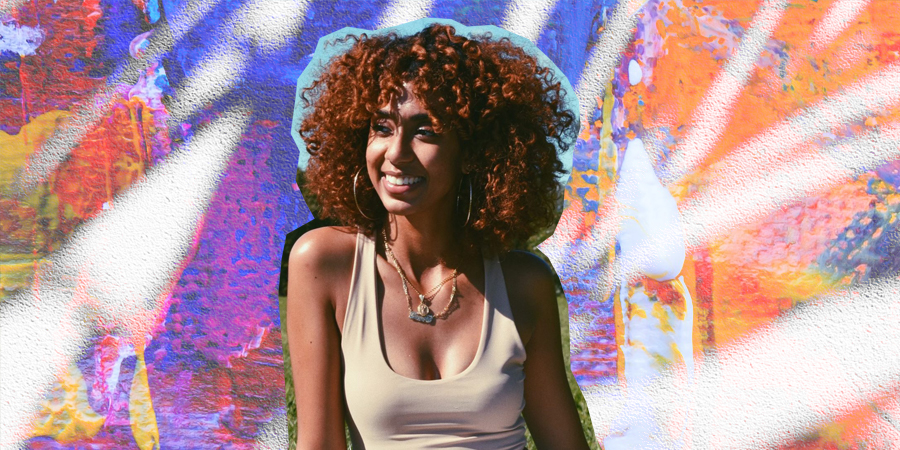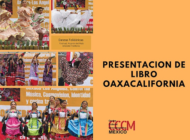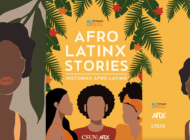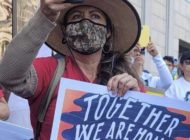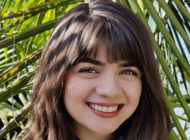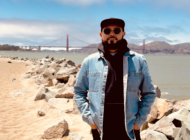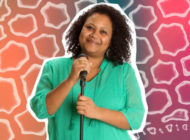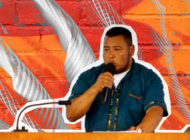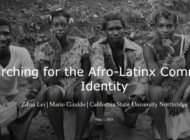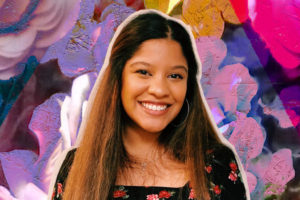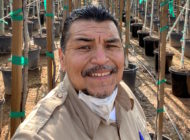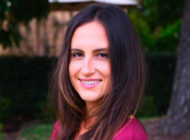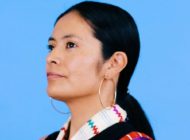In this episode, Jazmin Navarrete talks to Pamely Alejandra Gómez, a 25-year-old Afro-Latina born and raised in Yonkers, New York to Dominican parents.
By JAZMIN NAVARRETE
EL NUEVO SOL
Jazmin Navarrete: Welcome to Radio Nepantla, a podcast by El Nuevo Sol, the multimedia site for the Spanish-language journalism program at California State University at Northridge. My name is Jazmin Navarrete.
The title of this series is Afro-Latinx. We want to tell here diverse stories of Afro-Latinx, Black-Latinx, and Afro-Latin American identity.
According to the Pew Hispanic Center, one out of every four Latinos in the nation identify as Afro-Latinx. This is the same proportion of Afro-Latin Americans in that region.
We decided to use the term Afro-Latinx—with X—to be inclusive of non-binary people. The umbrella term “Black-Latinx” refers to biracial people with one African-American and one Latinx parent. The umbrella term “Afro-Latin American” refers to people of African ancestry in Latin America.
In this episode, I interviewed Pamely Alejandra Gómez, a 25-year-old Afro-Latina born and raised in Yonkers, New York to Dominican parents. She is the first American-born person in her family and she was given a unique name by her parents.
Pamely Gómez: People always ask me where I get my name and I think it’s like a Dominican thing. We love mashing names together. My mom wanted to name me Emily and my dad Pamela, so they were like, “why don’t we just put the names together?”
Jazmin Navarrete: Pamely’s parents moved to the United States from the Dominican Republic and established residency in Yonkers, New York—a diverse city with large Latinx and African-American populations.
Pamely Gómez: My parents, they got married in 92. And my mom—as she was explaining to me—the reason why she came to the U.S., she just felt stuck in D.R., as like every immigrant. They just know there’s better opportunities than what they have. So, she got a student visa and she came over here to the U.S. to study, but se le llenaron los ojos, of like all the good opportunities that she could do and she got scared and she didn’t do her studies. And then eventually my dad came here to the States—and that’s when they had me in ’96.
They arrived here in Yonkers and since then we’ve stayed here in Yonkers, obviously, hopping different houses. I think we’ve moved four times since we’ve been here, but I think this is just where we’ve planted the seed and continue to grow. I know there were talks we would move to a different state, somewhere warmer, but I think no one wants to leave Yonkers—no one wants to leave New York. This is where we’ve grown our roots and I think it’s just best to stay here.
It’s really diverse—well, by diverse, I feel like there is a huge population of Hispanics and Latinx people and huge population of the Black community here, as well. So, I feel like growing up, I grew up in the bubble—that everyone got kind of along and everyone understood everyone. So, I feel like my community was very inclusive. So, I didn’t really think much of it because it was my reality. I grew up in an environment where everybody had the same resources, everybody had the same kind of access to things.
Me leaving Yonkers and going out, that’s when I kind of realized that actually not everybody has the same access to things. I was deprived of a lot of stuff—and the people in my community were deprived from a lot of stuff. And that’s where I kind of went through my identity journey—when I found out all of that. But, in general, in Yonkers I feel like things were inclusive.
Jazmin Navarrete: The diversity of Yonkers made Pamely feel she was raised in an inclusive community.
Pamely Gómez: I think Hispanic and Latinx families, I feel like they do everything together—it’s like a norm. It’s like if you’re doing something, you have to let everyone know that this is going to happen, and everyone needs to be included. And I feel like if a family member has a problem everybody jumps to like solve it. And even if a little secret you’re trying to hide, everyone will know. There was no issue within the environment that I was in. I think that when I was taken out of the environment that I was in, then that’s when I kind of realized there are issues. And I think we tend to normalize it a lot—It’s what were used to and what we grew up doing. I think now, as I’m 25 years old, I’m unlearning 25 years of myself. And kind of reshaping the way I thought things would be and reshaping my thinking and my attitude towards things. But in the moment, when I was growing up, it just felt like, “yep, we’re all going through this” and “this is everybody’s reality.”
Jazmin Navarrete: Spanish is the only language spoken in Pamely’s home as a symbol of their Dominican culture.
Pamely Gómez: My mom tells me all the time, when I have kids, she wants to make sure that the culture is still alive. And then I tell her, “then how are you going to learn English, Mom?” I think mostly we speak a lot of Spanglish in the house, so they can learn a few words and I could continue practicing my Spanish, but normally it’s mostly Spanish.
Jazmin Navarrete: Pamely’s connection to her Dominican roots became stronger when she had a chance to visit the island.
Pamely Gómez: I feel like going back to the motherland is always so refreshing. I feel like, since I live in New York City, you’re not used to too much nature and the beauty of having everything so natural. It’s just another breath of fresh air that you cannot describe. When I went back, when I was in sophomore year, we went for a wedding and it was for three days. And my mom was like, “we’re going to explore everything in three days.” So, we went to Jarabacoa, we went to Santiago, we went to other places too. But it was just embracing nature and seeing how life is so different from there. I also visited where my mom grew up, and I got to see the life that she was living. And we kind of spoke more about that, and how poor the family was—and what their house kind of looked like. It was a beautiful experience in those little three days and I wish it was more. But I got to see kind of where my parents grew up and really learn about their upbringing and why it kind of forced them to come here to the U.S.”
Jazmin Navarrete: Since she grew up in a Dominican family, Pamely feels strongly connected to her culture.
Pamely Gómez: My parents are always telling me, “when you have kids make sure you teach them this or make sure you teach them that.” I’m very big on it and I feel like Dominicans are like party animals so we love to dance including me, like, I love me some bachata, merengue y salsa. So, I’m always like in it—I’m just really bad at cooking, so I haven’t really done much there. So, I’m trying to see how I can learn, but my mom, she just gets super inpatient with me, So I’m trying to see if I can figure out ways that I can do recipes and learn how to do them and passing them down for generation after generation, but it’s been an uphill battle with my mom.
Since they immigrated from the Dominica Republic, it’s what they know and believe and breathe in each and every day. It’s like they grew up in that culture and they continue to live life around that culture. I mean obviously there’s some enhancements here and there because obviously they’ve come to the U.S. and things have changed. They’ve kind of passed down what they’ve learned to me, and obviously I’m gonna pass down some stuff they’ve taught me to my kids if I have them, obviously making little tweaks cus I’m like, “why did we do it this way?—we could have done it differently.” But obviously, they probably tweaked some stuff when they grew up. So, little by little, I think just knowing that you’re Dominican and knowing the roots you came from is really important. And sometimes I don’t include it into my life cus there’s some aspects of it that I’m just like, “that doesn’t really go with what I like doing.” But yeah, they tend to always bring down their teachings to me and my little brother.
Jazmin Navarrete: Pamely’s emerging identity as Afro-Latina, however, made her think of the Dominican Republic beyond its European influences.
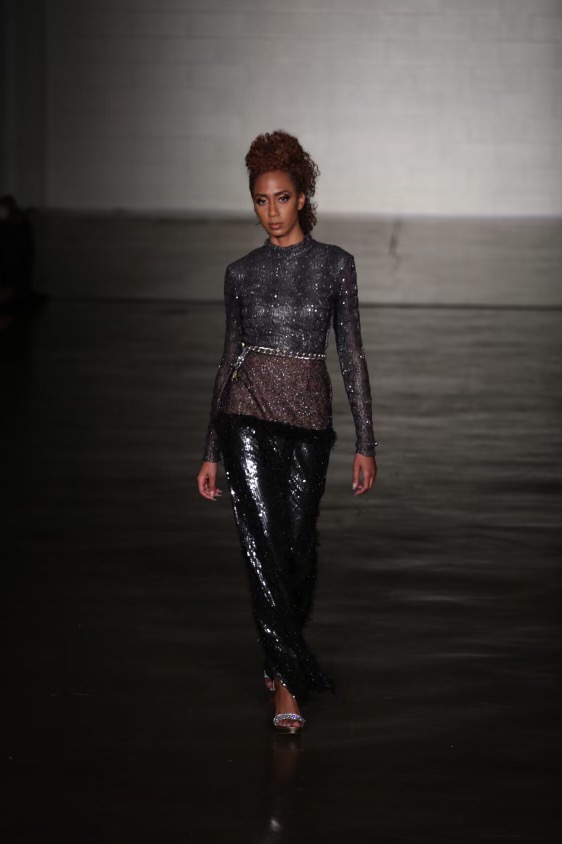 Pamely Gómez: I feel like being an Afro-Latina there is a lot of stuff that people don’t know. I feel like it’s being normalized now, and I think there is a lot of westernized kind of thinking that goes behind it that people were afraid to be identified as Afro-Latinas and so I feel like in my family in particular, saying that I’m an Afro-Latina is kind of a taboo and I think it’s because of the way they grew up and it was the westernized mentality of how features are supposed be looking like and how skin complexion is supposed to look like or how you’re supposed to behave. So, I think the way my parents kind of taught me the Dominican culture was kind of westernized and I don’t think I have that African kind of history or knowledge of why things are such. I mean there’s some music that we listened to that have like these African beats to them and they have like a history behind them, but it’s just like they don’t want to express more of it because they don’t want be to dig deeper into it, but, it’s just like, this is what people in ancient world kind of listened to, but never really go into the nitty gritty of the history. So, I feel like I kind of missed out on that, but on the super official level, obviously, things were taught in terms of the food, the music, the language we speak and like the things that we wear was obviously shown to me but kind of the history of why things are like this was not.
Pamely Gómez: I feel like being an Afro-Latina there is a lot of stuff that people don’t know. I feel like it’s being normalized now, and I think there is a lot of westernized kind of thinking that goes behind it that people were afraid to be identified as Afro-Latinas and so I feel like in my family in particular, saying that I’m an Afro-Latina is kind of a taboo and I think it’s because of the way they grew up and it was the westernized mentality of how features are supposed be looking like and how skin complexion is supposed to look like or how you’re supposed to behave. So, I think the way my parents kind of taught me the Dominican culture was kind of westernized and I don’t think I have that African kind of history or knowledge of why things are such. I mean there’s some music that we listened to that have like these African beats to them and they have like a history behind them, but it’s just like they don’t want to express more of it because they don’t want be to dig deeper into it, but, it’s just like, this is what people in ancient world kind of listened to, but never really go into the nitty gritty of the history. So, I feel like I kind of missed out on that, but on the super official level, obviously, things were taught in terms of the food, the music, the language we speak and like the things that we wear was obviously shown to me but kind of the history of why things are like this was not.
Jazmin Navarrete: Going into her senior year of high school, Pamely realized she was not prepared for college.
Pamely Gómez: I feel like me growing up, I saw it as like the rite of passage, like everyone is going to go to college eventually, but there is a lot of preparation and a lot of stuff that you were supposed to do in high school that a lot people just wasn’t aware of and I got to that realization the summer of me going into my senior year so I did not prep for my SATs, I did not prep for any college essay, I did not prep on what schools I wanted to go to. I got into like an early age crisis, and I was really scared that I wasn’t going to make the dream in my head of going to college true. So, I started a club here in Yonkers, Latinos Por Educación, with my mom actually cus she was like “I gave you all that you had to grow up, but there’s some things that I lack, like knowledge, to really help you become the woman that you need to be here in the United States.” Because of the lack of knowing how to speak English and her lack of like finances she couldn’t really support much of the stuff that I needed to get done to prepare for this time so she was like “I know this is super late, but I’m going to try and help you now.” So, we started this club and we really raised a lot of voice around the Hispanic community. What’s really stopping Latinos and Hispanics from going to college? And that kind of really exposed me to a lot of stuff that I could do, like advocacy work. So, then I went to a college in the Bronx, it’s called Lehman College. I went there because I didn’t know what college I wanted to go to. I went there just to find myself in terms of where do I want to be when I grow up. Eventually I found out that I really loved dealing with people and talking to people and I was like maybe I should do HR. So, I was doing human resources at my school, but it didn’t support it. And I found a school that would do it better so that’s when I applied to Cornell University and I got in. It was there that I realized that I lost who I was. And it was mostly because it’s a PWI (predominantly White institution). And I was around a community where Hispanics and Blacks were literally the minority, like .001 percent of the school. Growing up in Yonkers, here, I was always exposed to a cohost of communities, cultures, ethnicities, and we all got along. But when I got to Cornell, it was like super segregated. Like the Black community would be in the Black community, the Hispanic community would be in the Hispanic community, the Whites would be the Whites, and Asians would be with the Asian. It was never like a mix—and since I was so used to being in a mix, it was so hard for me to pick where I wanted to belong and who I wanted to be with and then like I would always be hanging around with like the Blacks and African kids, but then I would also be hanging around with the Hispanics and I was just a mix. And they were like, “well, who are you going to belong to, are you gonna belong to the Blacks or are you going to belong to the Hispanics,” and I’m like, “well, I’m both so why can’t I do both?” But it was just a whole thing and I feel like the school in general—especially the minority students—everybody had an identity crisis there, like am I Black enough to be Black, am I Hispanic enough to be a Hispanic, and I’m like, “why can’t I be both?” So, that’s when I kind of found the term of an Afro-Latina and I started doing more research on it and I was like, “well that’s me—I am both.” And people kind of didn’t really understand it much and my family kind of doesn’t understand it much. And I kind of have that back-and-forth with them, but that’s where I kind of finally understood that there is a term for me and there is an identity for me and I am glad that I was taken out of what I thought was yeah a regular Hispanic girl or a regular Latinx girl, but when I got taken out of my community and placed in another where I felt like I was isolated, it kind of forced me to really dig deep into who I was and that’s where this term came to be.
Jazmin Navarrete: Pamely’s journey into Cornell University was unexpected.
Pamely Gómez: When I was at Lehman, I was literally hopping every major possible. I first got in there as undeclared and then I was like you know what maybe I should be a doctor and then I went to this premed thing and I was like I can’t do this cus the amount of years that you have to take to be a doctor and the amount of debt you have to be in to go through it’s not ideal. So, then I got out of that, but I was just jumping around so much then I went to my academic advisor and I was like I don’t know what I wanna do and she was like we’re opening a program where you double major in math and Econ who knows if that’s what you like, and I was like yeah, I like math but I don’t think I like it that much. It turned out I was one of the few girls that was in that double major program so I felt like oh wow I can really make a difference and really stand for this representation that I absolutely love and kind of show other people that they could come in to this program as well and I was kicking ass, like I was doing great.
So, my academic advisor since I was really close to her and I was always in her office constantly just like talking through things she told me to attend this international women’s summit hosted by Bloomberg in the city, and I got invited. So, I went to the train and I got on to go into the city and the train broke down so then I ended up arriving at the summit an hour late and I had already missed like all the talks that I wanted to go to and they were ending with like a big lunch. During that I was also thinking that maybe I should transfer schools and talking about that HR stuff that I told you that I liked, we were exploring schools, so Cornell was at the top of my radar, but I didn’t think that I was ready to apply or I didn’t think I belonged in that place cus it was just it’s too prestigious, I don’t think I belong in an Ivy League, but I ended up arriving at the event an hour late like I said and they were having the lunch and I was just like you know what I’m just gonna pretend like I was here this whole time so I decided to sit in the table that was in the middle sat next to this one woman that was just talking so much about what she does at Bloomberg, and about what I wanna do, so I was telling her that I really like HR, but I don’t know what schools or programs offer it and she was like, “Oh my God have you considered Cornell?” And I was like “oh yeah, I have but I don’t think I can apply there.” And she was like, “why not?” and she was like, “you know what, my dad actually graduated from Cornell and maybe you guys should connect.” and I was like “I don’t think I want to talk to your dad but it’s fine,” and she was like no no no no she was like “give me your number, give me your email, and we can set something up.” And I was like okay. I got home and my mom was asking me about how the event went and I was like “yeah, I sat next to this, una loca, that she was just there talking so much to me, she wants me to meet her dad and she was like well that was crazy and I was like yeah and apparently her dad called me that night and he was just like my daughter doesn’t stop talking about you and I’m like well one, probably your daughter’s crazy or you’re crazy.
We ended up talking and he was like why don’t you meet me out for like coffee or lunch and we can talk more about what do you want to do with your career and where do you want to go. I was super scared so I told my mom “Mom this White man wants me to talk to him and his daughter and have coffee.” And she was like absolutely not she was like no this is like human trafficking or something like that and I’m like yeah, but like something in my spirit was telling me like Pam you should definitely go. So, I emailed him and I was like hey, we can totally meet, but I wanted to be in a public setting cus I really don’t know who you are, I really don’t know who your daughter is and this just seems super weird and he’s like, yea we could do it in a public setting, my daughter’s going to come make sure that everything is fine. So, I ended up going and meeting him at a coffee shop in the city and we talked about my career and where I want to go and what do I see myself doing. Mostly I’m really excited about diversity and inclusion efforts. I’m really excited about HR. I’m really excited about representation because I feel like that’s really important. So, he was like yeah you should definitely apply to Cornell.
He was like I’m part of a Cornell club here in the city and one of the economists under Obama’s cabinet is coming to talk and he graduated from the school that you want to go to in Cornell. It was called the ILR school, Industrial Labor and Relations, and he was like you should totally come and join me and he was like I’ll send you a link and the amount of money to go see this man talk, I was like no I’m not going to spend over $100 to go see a White man talk about Trump and elections and stuff like that. It was during the time where Trump was running against Hillary and all that stuff, so he was like don’t worry I’ll pay for you. So, he paid for me and I ended up going and he forced me to go talk to this man that works for Obama and I was like I can’t speak well. I don’t know how I’m going to talk to him. So, I went up and talked to him and he did his presentation or whatever and the man forced me again to go talk to the man he was like just talk to him about what you wanna do where you wanna go. The man that was doing the presentation, his name was Seth Harris, he liked me so much that he invited me and the other two people that I was with, the daughter and the guy that I went to the coffee shop, for dinner. And Seth kinda sat next to me and we’re talking more, and he was like you said you wanted to apply to go Cornell right and I was like yeah and he was like tell you what, apply, write an email to the director of admissions, and CC me on the email, and I’ll let you know if you got in. So, I applied. I did the email and lo and behold I got a call from the director of admissions himself saying that I got in and a full ride so I didn’t have to pay anything for my studies. So that’s how that happened. When things are meant for you, it won’t miss you.
Jazmin Navarrete: When she arrived to Cornell, Pamely experienced constant microaggression and racism.
Pamely Gómez: It was like every time they were talk about like slavery or anything that they would say about like the African Diaspora, it was just like, we were tokenated, oh how was your experience or what was your experience. You really find how ignorant people were. There was one class that I attended that it was like a half semester class I was literally .5 credit and I attended it because I needed an elective. And it turned out I was the only person of color in the class. The class I think was about the social economic kind of growth of the future and everything was just super opinionated and I was always trying to figure out how I could be more involved in class. So, I would always raise my hand and ask questions, but the professor would always like downgrade me in a way. I would go and do that you know do the typical kiss ass as usual and he would like really denounce me saying like Oh my question is very irrelevant or I don’t know what I’m talking about and he actually failed me in the class. Meanwhile I was getting A’s and B’s in the class and what I did was that I got the grade I emailed the diversity and inclusion officer. I emailed the president, I emailed everybody and their mom that works in Cornell and I put the grade on there and I was like this man has been discriminating against me this whole entire time and I have witnesses as well. The students were always looking like why is he treating you like that or why is he behaving that way towards you. So, he emailed me back and he was like I’m considering a regrade, so I jumped from an F to a B plus. It was the story of my life all the time at Cornell like I would always have to work twice as hard to make myself more known and I think that’s the kind of what society is when it comes to Black women we always have to work twice as hard for us to really be noticed or have that foot in the door. So, it was always a push and pull. They were times where I was crying to go home and I was telling my mom like I don’t wanna be here no more.
Jazmin Navarrete: Pamely’s experiences at Cornell taught her a hard lesson on the need to set boundaries to protect herself from every day micro aggressions.
Pamely Gómez: I found out that I really tolerate a lot of stuff that aren’t okay, and I always ask myself that question: “how do I let this slide?” Going to Cornell I think I wasn’t used to being thrown in a place where there were so many micro aggressions and kind of dealing with, “do I yell at them? do I, like, say something back? do I just keep it in and keep pushing it?” Like, where do I have those boundaries? Where do I stand my ground? And I think when I was there it really taught me how to set those up. And really kind of forced me to think why wasn’t this okay and why did it make me feel this way. Cus growing up when things would what happened I’d be like you know it happens to everybody this is what happens to everybody, but at some point, you reach your bubble, at some point you reach your peak, and you’re just like how did I let it slide so I think they’re at Cornell, I started to unpack all of that.
Jazmin Navarrete: Her first job after graduation was not what Pamely expected and she struggled, but then things stared to change for her.
Pamely Gómez: I ended up landing in a company that was near my school although I hated the community so much and I said I wasn’t going to be around it anymore because it was typically White, I landed a job still in the community and still very White. I just felt like I was thrown into a space where I didn’t belong basically short and sweet. I was literally the only Hispanic woman, my texture, my complexion, in HR and I was like that is a problem and it just didn’t feel like it fit with my personality at all cus I’m very bubbly and very collaborative and the workspace that I was in was just very stereotypical suit and tie, businesses corporate America, with the gray cubicles and just everybody was super quiet and everybody was just old, so I didn’t have anybody my age to connect with I just felt like I would work and go home and started all over again there was no like nightlife there was no like after stuff things I could do there downtown area was literally one street so it was just boring. My mental health went to zero and my face was completely filled with stress pimples so I hated my life and I need it out. So eventually I left and I moved back down here to Yonkers with my parents and I was just like I’m just gonna find myself again because that wasn’t it, I know I like HR but it’s just like, what an HR that I really like, what I didn’t like, and how could I reshape it. You saw my page. I love modeling, I love taking pictures. There was one picture I took the summer before joining this job and I tagged Tyra Banks and Tyra Banks liked it and then she posted it on her page. So, then my phone was ringing, ringing, ringing, when I was at work and I saw that and I became viral in like a day with this picture so I was like wow god maybe that’s my sign so that’s when I left my job and I came down here and I started doing modeling. And I absolutely loved it. I met so many people. I did New York fashion week, I did Brooklyn fashion week, I was in a whole bunch of music videos, I was flown out to Miami to be part of this reality TV show, I was in a commercial campaign down here in the city. So, I was really moving and grooving but at the same time I was also interviewing for jobs cus I was like I can’t be living this type of lifestyle and like not being paid. So I landed in the job that I am now and it’s located in Washington D.C. so when I got the offer I moved down to Maryland and I was living there but I moved down there it was February 2020 and then COVID hit March 2020, so then my mom was like well if this is the last time we’re going to see each other I think it’s best for you to come up here again and work remotely from home so I got an apartment and then I got out of my apartment to come live with my parents and I’ve been here ever since and I’ve been working remotely from the company that I am now in Washington D.C. and now they’re gonna be opening an office in New York so I’m gonna be working out of the office now.
Jazmin Navarrete: Pamely plans to continue working on modeling and also working on her music.
Pamely Gómez: I would love to cus when I moved down to D.C. obviously there’s not much of a creative community down there and I was trying to figure out ways of how I was gonna pay the cost of me traveling from D.C. to New York constantly, but now since I’m gonna be staying in New York I have the facility to do that, but then COVID’s here so I mean there’s ways that I could do it if I’m really hungry to do it now, but I just want to be super safe cus there’s just like with the fashion world, with the entertainment world, it’s just a lot of people you have to meet with and it’s just very tough, but I’m building on it like I have friends that were gonna actually have a photo shoot this weekend that I’m super excited with so things are moving.
I’ve been singing since I was five. I start singing at church with my dad since then that’s really been a huge part of my identity and it’s just now that I’m making music and bringing it out, I think I kind of convince myself that it doesn’t have to be perfect to be music and it’s kind of the first time that I’m bringing it out to the world.
Jazmin Navarrete: On her Instagram bio, Pamely wrote, “Representation is everything.” Something that is important not only on her personal life, but also in her work.
 Pamely Gómez: Representation it’s definitely important and my job right now I’m a recruiter and my title is talent acquisition specialist. I’m always bringing in talent into the company and that’s when I kind of found what I wanted to do in HR. I love putting people on, I love networking with a whole bunch of people, and talking through what do you want to do, where do you see yourself going. What I find fascinating and interesting is that how people of color, and Hispanics and Latinx really attracted to other Hispanic and Latinx, so when they see that I’m recruiting, I get more people that are from my type of background come to me and talk more so I’m seeing that presentation is a really huge factor when it comes to recruiting. So, when I’m like interviewing people I will like talking to people of diverse communities I think it’s much more of an understanding like oh she gets me and I see her and if she’s working there, I probably could work there too. I’m constantly advocating in my job I spearheaded, well one of the people that spearheaded, we call it the DEBI chapter, it’s called Diversity Equity Belonging and Inclusion and I’m really trying to build up a programmatic piece of how we can incorporate that into our company and how we can really stretch out what we do into the community. So, I’m always trying to figure out how I can put in some of my knowledge to really help students and adults like us to really reach their full potential. I’m always constantly talking about how this can affect us and what are ways that we can build up that allyship.
Pamely Gómez: Representation it’s definitely important and my job right now I’m a recruiter and my title is talent acquisition specialist. I’m always bringing in talent into the company and that’s when I kind of found what I wanted to do in HR. I love putting people on, I love networking with a whole bunch of people, and talking through what do you want to do, where do you see yourself going. What I find fascinating and interesting is that how people of color, and Hispanics and Latinx really attracted to other Hispanic and Latinx, so when they see that I’m recruiting, I get more people that are from my type of background come to me and talk more so I’m seeing that presentation is a really huge factor when it comes to recruiting. So, when I’m like interviewing people I will like talking to people of diverse communities I think it’s much more of an understanding like oh she gets me and I see her and if she’s working there, I probably could work there too. I’m constantly advocating in my job I spearheaded, well one of the people that spearheaded, we call it the DEBI chapter, it’s called Diversity Equity Belonging and Inclusion and I’m really trying to build up a programmatic piece of how we can incorporate that into our company and how we can really stretch out what we do into the community. So, I’m always trying to figure out how I can put in some of my knowledge to really help students and adults like us to really reach their full potential. I’m always constantly talking about how this can affect us and what are ways that we can build up that allyship.
Jazmin Navarrete: Pamely believes there is not enough representation and inclusivity in the modeling world.
Pamely Gómez: There isn’t none. I feel like you have this stereotypical westernized woman figure and kind of what they look like. I’m in nowhere near that height that they have. I’m 5’6 and they’re always like we’re looking for women that are like 5’9 and above. I have the size, size zero, but I don’t have the height. I’ve seen it a lot of people in the modeling industry really lose who they are and want to be shaped the way that social media thinks this is what models look like right you’re always trying to change your appearance and how do you look like to accommodate what people are looking for and I’m like why don’t you just embrace your own beauty why can’t what you see be enough. So, I’ve been part of a lot of collectives and initiatives. I was part of this initiative called Melange, which they embrace kind of every walk of life. We did a campaign with the human rights campaign. I’m really embracing coming from a space of love and understanding and really embracing everybody’s bodies and everybody’s identity and I think it’s very important as we continue to go on in our journey in this universe because a lot has changed, but a lot hasn’t changed so moving that needle and talking more into it’s really important. I kind of do modeling to really show my face and show were here and we wanna make a change I’m not solely doing it because you know oh I am pretty so I want to do this and I want to do that, but no I wanna have like a narrative or kinda have a conversation around like, why my hair is important, and why is my skin important, and why is it important to have it on magazine for girls to see, and why is it important to be on social media for other people to see, and really uplifting us right because I feel like sometimes when there’s a lot of stereotypes around like what we do and we kind a go against ourselves too. There’s so many clashes between like Black women against Black women, or Hispanic women against Hispanic women so it’s just like building that community internally as well, is very important. So, I’m all up for it and it’s just like how do we continue that conversation and how could that really be brought out more.
Jazmin Navarrete: Pamely shared some advice for young Afro-Latinas who are still struggling to define themselves and pursue their careers.
Pamely Gómez: Never stop believing in you. I feel like sometimes we’re thrown in a society where you feel like you don’t belong and that’s okay. And I think that’s beautiful. I think that’s unique, like my name. My name is unique—no one has it and you take ownership of it, right? If you’re different, I don’t think you should be changing yourself to mold yourself into what other people believe you should be because if that will change your authenticity, that will change who you are at the core and then you’ll lose yourself and then you’ll end up in a place where you’re just like what the F happened, like how did I get here? And then you have to retrace back so alleviate yourself from that struggle by constantly believing in yourself and making sure that you put yourself first at times and being true to you because obviously people sometimes lie to themselves, “no, this is okay.” But is it really okay and how is it affecting you? So stay true to yourself.
Jazmin Navarrete: Thanks for listening to Radio Nepantla—La Voz que Traspasa Fronteras. We invite you to listen to the rest of the series Afrolatinx … We will tell you stories of Afro-Latinx identity.
Listen to our podcast on your favorite platform. You can also check our SoundCloud channel—ElNuevoSol—or our website: ElNuevoSol dot net.
This was a production of El Nuevo Sol—the multimedia project of the Spanish-Language Journalism program at Cal State University, Northridge.
This episode was produced and edited by: Jazmin Navarrete.
Voice (or voices): Jazmin Navarrete and Pamely Gomez.
Music by [the Afro-Colombian group Kombilesa Mi].
See you next time.
Tags: #AFLX Afro-Latinx Dominican Republic El Nuevo Sol Jazmin Navarrete Pamely Gómez Radio Nepantla Yonkers NY







